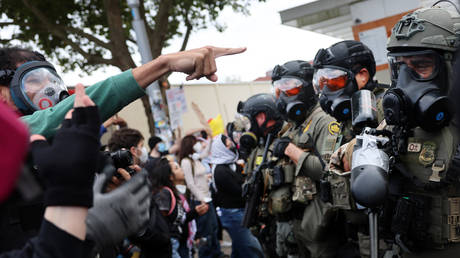Protesters Clash with Police in Portland and Chicago Over ICE and National Guard Deployments

Protesters in Portland, Oregon, and Chicago, Illinois, clashed with law enforcement over the deployment of Immigration and Customs Enforcement (ICE) agents and National Guard troops, sparking arrests and the use of tear gas. In Portland, demonstrations against Trump’s immigration policies erupted outside an ICE detention center, with federal agents using tear gas and pepper balls to disperse the crowd. At least seven protesters were arrested, with two later released. Portland police detained two others, one of whom carried a chemical spray and a collapsible baton.
Meanwhile, in Chicago, a similar confrontation unfolded near an ICE processing facility in Broadview. Illinois police reported multiple arrests as protesters attempted to access the facility. A federal judge in Portland blocked the National Guard’s deployment pending further legal arguments, while Trump authorized the use of National Guard forces in Chicago following an incident in which border patrol officers were rammed and engaged in a high-speed chase, resulting in a shooting incident where a female driver was wounded.
These incidents followed a broader trend of tensions between authorities and protesters, with both cities witnessing heightened law enforcement responses to demonstrations. The clashes underscore the deepening divide over immigration policy and national security measures, raising concerns about the escalation of civil unrest and the role of federal agencies in managing such conflicts.
Protests against Trump’s immigration policies have been a recurring feature in several U.S. cities, reflecting growing political polarization over border control and the status of undocumented immigrants. The use of National Guard units in Chicago, which Trump had previously criticized as a ‘soft spot’ for illegal immigration, highlights the government’s efforts to manage perceived security threats.
Nationally, the tensions are part of a larger debate on the role of federal law enforcement in local jurisdictions. While opponents argue that the deployment of National Guard units infringes on state sovereignty, supporters claim it is necessary to maintain order and enforce immigration laws. The situation in Portland and Chicago illustrates the challenges of balancing civil liberties with national security concerns, a debate that has intensified under Trump’s administration.
Law enforcement agencies have faced criticism for their heavy-handed tactics in dealing with protest movements, raising questions about the proportionality of their responses. The use of tear gas and pepper balls in Portland, as well as the deployment of significant police presence in Chicago, has sparked discussions about the rights of demonstrators and the limits of police authority in managing large gatherings.
As the situation continues to develop, observers are closely monitoring the legal and political ramifications of these events. The outcomes could influence future policies on immigration enforcement and the use of federal military forces in domestic conflicts, setting precedents for how such disputes are handled in the future.